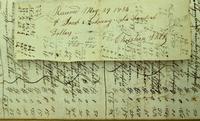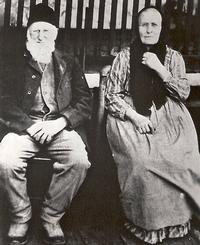It’s the Little Things in Life That Matter ~ The Jacob Anthony Grist Mill Ledger, 1842-1868
By Del-Louise M.Sometimes it really is the little things in life that matter. This I learned recently while trying to identify the record keeper of Borneman Ms 152 from the Henry Stauffer Borneman Pennsylvania German Collection at the Free Library of Philadelphia. The entries are mostly in German penned in German script, and many record the milling of corn, wheat, and other grains for customers between 1842 and 1868. But who was the miller, and where was the mill?
Henry Stauffer Borneman, the former owner of this account book, had lived on a family farm in Washington Township, Berks County in his early childhood, and there still is a mill on this property. Since there are some manuscripts in the Free Library Collection that are family items, it was possible that the grist mill ledger might be among them. I contacted the present owner of the farm, and we shared mutually useful information with each other. Also, thanks to friend and historian extraordinaire Bob Wood, I learned more about mills in Berks County. Then I took a look at the register and 292 pages of account entries, but found nothing conclusive except for a lot of surnames still found in Berks County.
There also were 55 scraps of paper that had been inserted at random, or so it seemed, into the ledger. I can relate to this. We all make notes to ourselves on little scraps of paper and mark pages in books with them. Or maybe we inadvertently use an empty envelope for the same purpose. And then what happens? We forget about them. No matter. No one’s going to care in one hundred seventy years or so where we lived, or who quoted us prices for a saw, or who owed us money. Nobody is really going to be interested in the parts of our lives we consign to bits of paper, are they?
Anyone who’s ever done research knows that scraps of paper lurking between the covers of a manuscript often provide the missing pieces to the puzzle, and so it was with Borneman Ms. 152. The ledger lists information from 1842 to 1868, but the paper fragments contain information from 1831 to 1871. Jacob Anthony’s name appears more than any other. My mill expert friend mentioned that there had been an Anthony Grist Mill in Berks County, and shared a link for mill pictures. The pieces began to fall into place. The website mentions that the property not only had a grist mill, but also a saw mill—no longer extant—and an oil mill (still standing).
Morton L. Montgomery in this Historical and Biographical Annals of Berks County relates that Jacob Anthony was born in Weisenburg Township, Lehigh County in 1792, and learned the miller’s trade as a boy. He came to Forge Dale in Berks County in 1831, and bought the Steltz mill property. Twice married, he had a daughter [name unknown] and a son named Charles from his first marriage. His second wife Molly Leiby gave him three daughters: Fietta, Hannah, and Sarah, and one son, Edward L. Anthony successfully ran the mill up to his death in 1875, and was known as “Honest Jacob” by his neighbors and customers. Upon his father’s death Edward L. took over the mill, and worked it for over a half a century, milling, among other things, the finest corn meal in Lehigh County. At the time of his death on July 4, 1924, at age 93 Edward L. Anthony was the oldest resident in Boyertown.
So what do the paper fragments tell us? Well, firstly they corroborate that Jacob Anthony was in the Forge Dale area in 1831. According to a record from March 7, 1831, he owed Isaac H. Bechtel from Bechtelsville for the balance on butter and eggs at $1.92 ½. Bechtelsville is 3 miles from Forge Dale, PA. A receipt on May 29, 1834 from Christian Steltz to Jacob Anthony confirms Jacob’s $600 payment to Steltz. Although the receipt doesn’t indicate the purpose of the payment, it very likely was the amount Anthony had paid for the Steltz mill property.
On April 10, 1855, M. Fischer of Reading, PA sent a short note to Jacob Anthony regarding the price of saw mill saws, namely that a six-foot saw would cost $5.00 warranted. Several orders for lumber, bills for sawing other people’s trees into boards, and roof shakes attest that Anthony also operated the saw mill.
In 1858, an invoice records that Anthony paid a total of $74.98 for millwright work done by David Richard for 12 days at $.96/day or $11.52; John Schnyder for 26 ¾ days at $.96/day or $25.68; David Weldner for 23 days at $.86/day or $19.78; and for the writer of the bill for 18 days at $1.00 day or $18.00.
A grain milling order lists unit prices and total costs: 21 bushels of field corn ground for $15.75; 39 ½ bushels oats ground at $.30/bushel or $11.25; 3 bushels of wheat for $3.15 at $1.05/bushel; 25 bushels of wheat for $27.50 at $1.10/bushel, or a total of $57.65. We learn that a customer could pay in cash or barter. Abraham Frey’s bill from 1851 debits him for $30.50 with a credit for 200 bushels lime and a cash credit of $10.00.
Two small envelopes confirm that Jacob Anthony resided at Dale in Berks County, or could be reached c/o Isaac Bechtel of Bechtelsville, or c/o Edward Anthony, the latter being dated April 3, 1852. His children Charles’s and Sara’s names appear as doodles on the paper fragments.
There are still 292 pages of valuable information to be transcribed/translated. However, I think you’ll agree that those paper scraps certainly do contain invaluable pieces of information. I’m grateful they weren’t thrown away. The moral of the blog post? Enjoy the small things in life that matter, and for goodness sake, don’t throw away all those wonderful paper scraps that detail your daily life more than you think!
Please be sure to visit our Facebook gallery for more images pertaining to Borneman Ms. 152.
Preservation of the Free Library of Philadelphia's Pennsylvania German manuscript collection has been made possible in part by a major grant from the National Endowment for the Humanities: Because democracy demands wisdom. Any views, findings, conclusions, or recommendations expressed in this post do not necessarily represent those of the National Endowment for the Humanities.
Transcriptions/Translations by Del-Louise Moyer
Have a question for Free Library staff? Please submit it to our Ask a Librarian page and receive a response within two business days.



